-
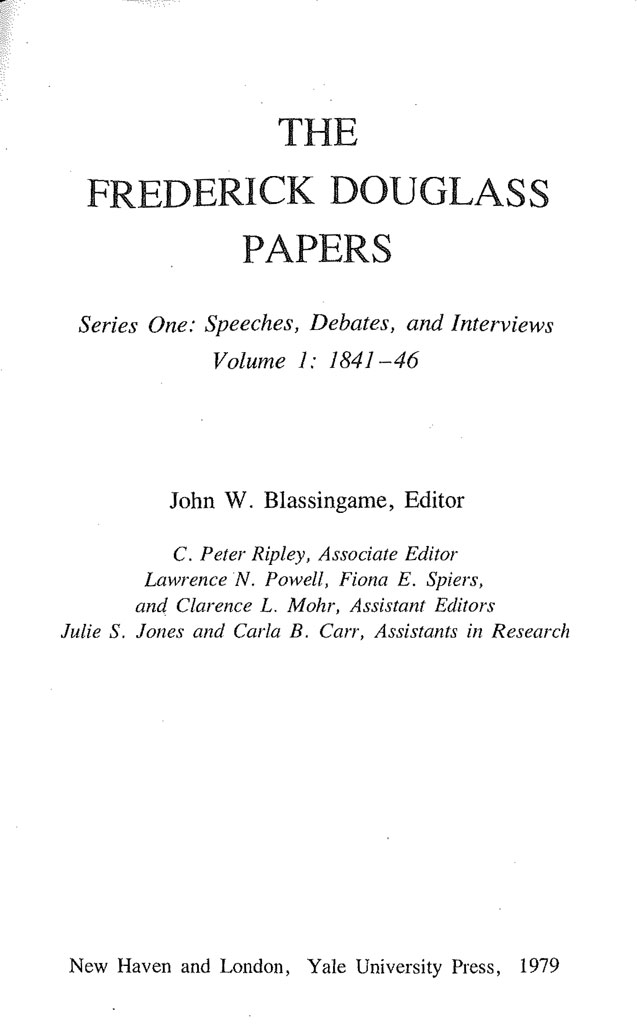
This volume covers speeches from the years when Douglass first enlisted in the abolitionist movement, wrote his iconic Narrative, and began a lengthy tour of the England, Scotland, and Ireland, speaking on behalf of the antislavery movement.
-
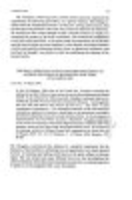
This volume of Douglass’s speeches includes the second half of his first British tour; his establishment of an antislavery newspaper in Rochester, New York; his break from his Garrisonian abolitionist mentors; and his alignment with political abolitionist groups.
-
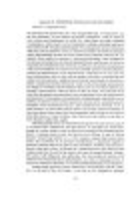
The third volume of the series contains Douglass’s speeches on the growing sectional controversy over slavery and the early years of the Civil War.
-
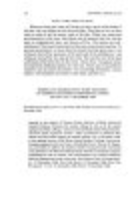
-
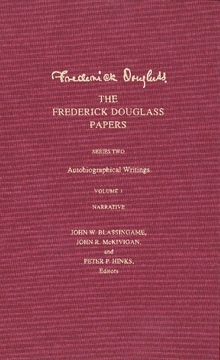
This volume contains the first and most famous of Frederick Douglass’s three autobiographies, Narrative of the Life of Frederick Douglass. First published in Boston in 1845, only seven years after Douglass’s escape from bondage, the Narrative provided the foundation for its author’s antebellum reputation as a writer. Douglass went on to write two more autobiographies, becoming one of a very small number of nineteenth-century Americans to publish more than one account of their lives. His books provide an unparalleled record not only of the events of his life but also of his shifting perceptions of the complex worlds of slavery and freedom that he inhabited. The autobiographies reflect the differences in his age (the first was written when he was twenty-seven, the last when he was in his seventies), his memory, and his objectives at the various times of his writing.
This authoritative edition of Douglass’s first autobiography is comprehensively annotated and is accompanied by reproductions of historical documents relating to its publication and critical reception. The volume includes a series introduction, volume introduction, historical annotation, and appendixes.
-
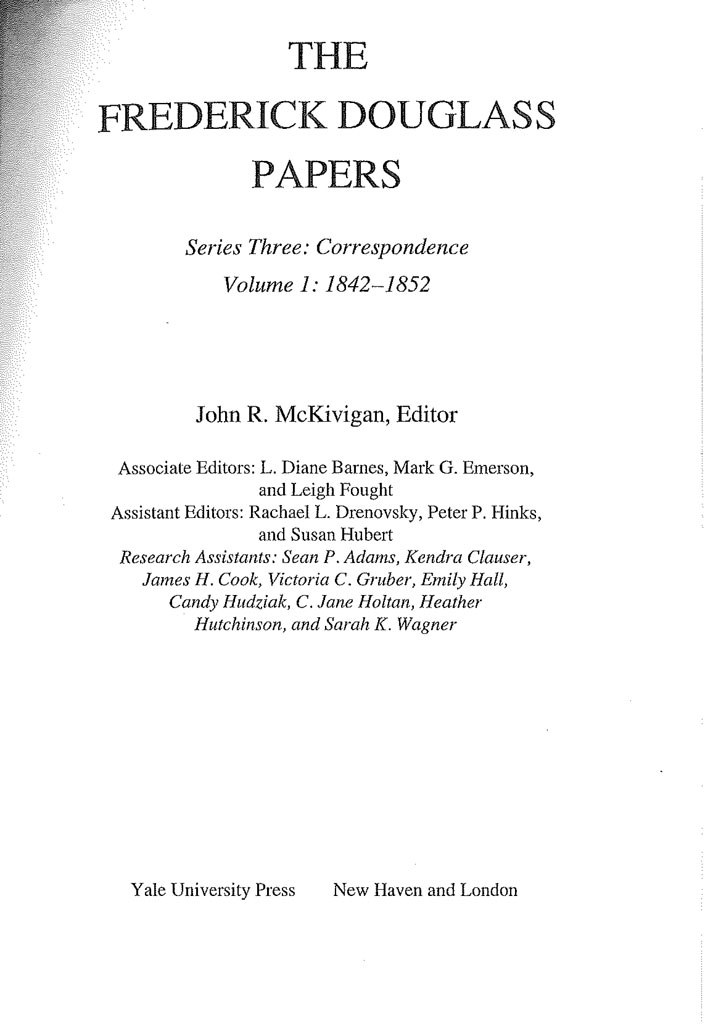
This volume of The Frederick Douglass Papers represents the first of a four-volume series of the selected correspondence of the great American abolitionist and reformer. Douglass's correspondence was richly varied, from relatively obscure slaveholders and fugitive slaves to poets and politicians, including Horace Greeley, William H. Seward, Susan B. Anthony, and Henry Wadsworth Longfellow.
The letters acquaint us with Douglass’s many roles—politician, abolitionist, diplomat, runaway slave, women’s rights advocate, and family man—and include many previously unpublished letters between Douglass and members of his family. Douglass stood at the epicenter of the political, social, intellectual, and cultural issues of antebellum America. This collection of Douglass’s early correspondence illuminates not only his growth as an activist and writer, but the larger world of the times and the abolition movement as well.
-
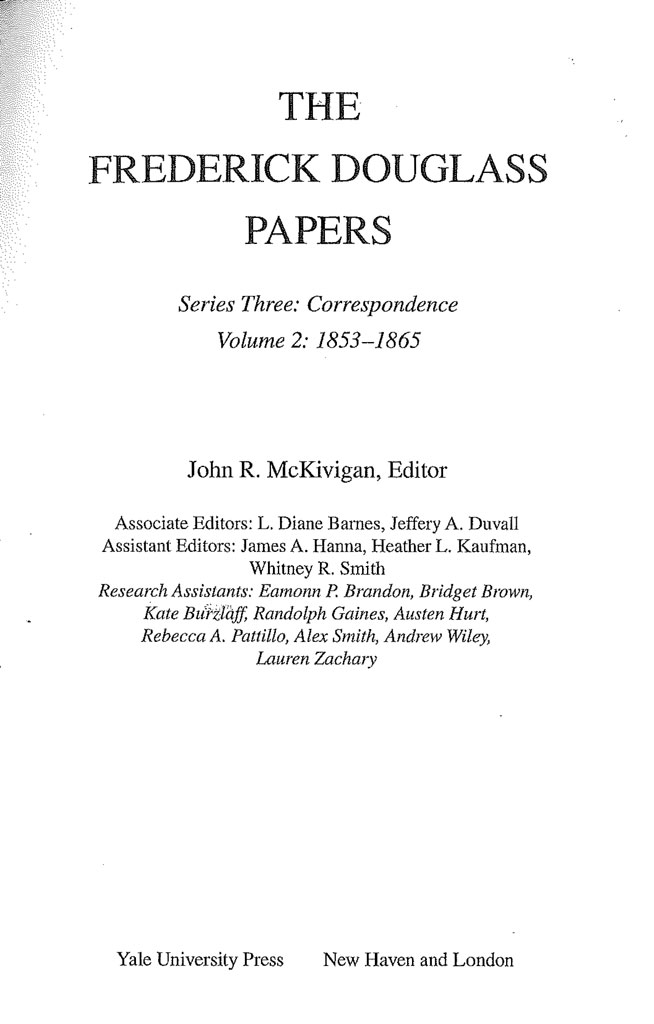
A second volume of the collected correspondence of the great African-American reformer and abolitionist features correspondence written during the Civil War years.
The second collection of meticulously edited correspondence with abolitionist, author, statesman, and former slave Frederick Douglass covers the years leading up to the Civil War through the close of the conflict, offering readers an illuminating portrait of an extraordinary American and the turbulent times in which he lived. An important contribution to historical scholarship, the documents offer fascinating insights into the abolitionist movement during wartime and the author’s relationship to Abraham Lincoln and other prominent figures of the era.
-
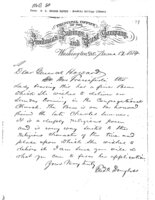
The selected correspondence of the great American abolitionist and reformer dating from the immediate post–Civil War years
This third volume of Frederick Douglass’s Correspondence Series exhibits Douglass at the peak of his political influence. It chronicles his struggle to persuade the nation to fulfill its promises to the former slaves and all African Americans in the tempestuous years of Reconstruction.
Douglass’s career changed dramatically with the end of the Civil War and the long-sought after emancipation of American slaves; the subsequent transformation in his public activities is reflected in his surviving correspondence. In these letters, from 1866 to 1880, Douglass continued to correspond with leading names in antislavery and other reform movements on both sides of the Atlantic, and political figures began to make up an even larger share of his correspondents.
The Douglass Papers staff located 817 letters for this time period and selected 242, or just under 30 percent, of them for publication. The remaining 575 letters are summarized in the volume’s calendar.
-
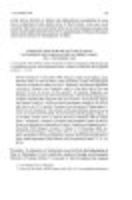
The final volume of the series contains speeches protesting the federal government’s retreat from the protection of African American rights and advocating the development of Black educational and economic institutions.









